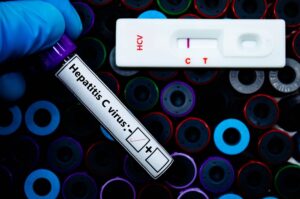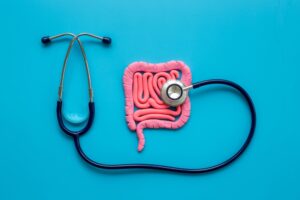
Signs of Stomach Ulcers
Stomach ulcers are open sores that develop on the lining of the stomach or small intestine, but heartburn is caused when stomach acid flows back into the esophagus.

Irritable Bowel Syndrome (IBS) and Celiac Disease are the two most common gastrointestinal diseases that affect a majority of the population. Statistics show that over 40% of Americans suffer from a gastrointestinal disorder. When thinking about IBS vs Celiac Disease, both share multiple symptoms and are often mistaken for one another.
They are both chronic conditions that require long-term treatment. For proper diagnosis and treatment, it’s important to understand the key distinctions between IBS vs Celiac Disease. We’ll cover everything you need to know about the difference between IBS vs Celiac Disease to help you or your loved one get the right treatment.
IBS is a gastrointestinal disorder that affects the stomach and the intestines. The disease is characterized by discomfort in the digestive system. People with IBS may experience different symptoms depending on the type of IBS they suffer from, and this includes:
Celiac disease is an immune disorder that triggers an immune response in the small intestine whenever you ingest gluten. Over time, as you take more gluten, the immune reaction causes damage to the lining of the small intestinal walls. This prevents the small intestines from absorbing nutrients into the body, causing malnutrition and may further weaken the body’s immunity.
The cause of IBS is still unknown. However, multiple factors play a role in the development of IBS, including:
Certain foods may trigger IBS symptoms, but the list varies from person to person. The most common foods that trigger IBS symptoms include:
The exact cause of the celiac disease is unknown, but certain factors increase the risk of the disease, such as:
Celiac disease is mainly triggered by gluten consumption. Whenever a harmful substance is detected in the body, an immune response is initiated (antibodies) to fight against the substance. For celiac disease, the body mistakes gluten for a harmful substance, thereby triggering an autoimmune reaction to fight gluten. As a result, the antibodies released cause inflammation in the small intestines, triggering the symptoms associated with Celiac disease.
Gluten is a protein found in cereals like wheat, rye, and barley. People with celiac disease should refrain from taking any foods that contain gluten, such as:
Symptoms of IBS and celiac disease range from mild to severe and vary among individuals. Patients with IBS and celiac disease often experience mild abdominal pain, discomfort, or changes in the stool (diarrhea/constipation) from time to time when triggered.
Seek medical help immediately if you experience any of the following symptoms:
Gastrointestinal diseases like IBS and celiac disease can disrupt and affect your quality of life. While both conditions have no cure, you can manage the symptoms with ease and live a normal life with the right treatment plan. If you have been diagnosed with IBS or celiac disease or experience any symptoms related to the conditions, it’s important to speak to a gastroenterologist immediately.
Our team of board-certified gastroenterologists diagnoses and treat IBS and celiac disease. We provide customized treatment plans for all GI conditions. Contact us today to schedule a consultation with a gastroenterologist.

Stomach ulcers are open sores that develop on the lining of the stomach or small intestine, but heartburn is caused when stomach acid flows back into the esophagus.

Poorly absorbed carbs may ferment in the gut, leading to symptoms such as bloating, gas, diarrhea, or constipation.

If left untreated, GERD can lead to complications including esophagitis (inflammation of the esophagus), strictures (narrowing of the esophagus), or even Barrett’s esophagus, a condition that increases the risk of esophageal cancer.

IBS-C often requires a tailored approach that incorporates dietary changes, stress management, and sometimes prescribed medications to regulate bowel movements and reduce discomfort.

Hepatitis C can affect women differently due to hormonal variations, immune system responses, and unique physiological factors

This connection means that stress, anxiety, and other psychological factors can directly impact gut function, leading to symptoms like abdominal pain, bloating, and irregular bowel movements.

Chronic inflammation associated with IBD can lead to complications such as joint pain, skin conditions, eye issues, and more.

How different types of fiber affect IBS is crucial to creating a diet that supports digestive health without triggering flare-ups.

Lactose Intolerance occurs due to a deficiency of lactase, the enzyme responsible for digesting lactose in the small intestine.

This condition can result from various factors, including poor diet, stress, infections, or underlying health conditions like IBD.

One of the most essential steps in managing IBS is identifying specific triggers and paying attention to your body’s unique responses.

Although the symptoms of IBS can vary widely from person to person, several common signs are associated with the condition.
For Your Visit
Brick Office
P: 732-458-8300
Brick Medical Arts Building
1640 Route 88, Suite 202
Brick, New Jersey 08724
Mon – Fri: 8:30AM – 5:00PM
Sat & Sun: Closed
Neptune Office
P: 732-776-9300
Jersey Shore Medical Arts Building
1944 Corlies Ave. Suite 205
Neptune, New Jersey 07753
Mon – Fri: 8:30AM – 5:00PM
Sat & Sun: Closed
Jackson Office
P: 732-928-2300
706 Bennetts Mills Road
Jackson, New Jersey 08527
Mon – Fri: 8:30AM – 5:00PM
Sat & Sun: Closed
© All Rights Reserved